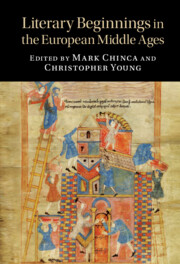
- Publisher:
- Cambridge University Press
- Online publication date:
- August 2022
- Print publication year:
- 2022
- Online ISBN:
- 9781108776912
- Subjects:
- Literature, Anglo Saxon and Medieval Literature
Our systems are now restored following recent technical disruption, and we’re working hard to catch up on publishing. We apologise for the inconvenience caused. Find out more: https://www.cambridge.org/universitypress/about-us/news-and-blogs/cambridge-university-press-publishing-update-following-technical-disruption

How did new literatures begin in the Middle Ages and what does it mean to ask about such beginnings? These are the questions this volume pursues across the regions and languages of medieval Europe, from Iceland, Scandinavia, and Iberia through Irish, Welsh, English, French, Dutch, Occitan, German, Italian, Czech, and Croatian to Medieval Greek and the East Slavonic of early Rus. Focusing on vernacular scripted cultures and their complicated relationships with the established literary cultures of Latin, Greek, and Church Slavonic, the volume's contributors describe the processes of emergence, consolidation, and institutionalization that make it possible to speak of a literary tradition in any given language. Moreover, by concentrating on beginnings, the volume avoids the pitfalls of viewing earlier phenomena through the lens of later, national developments; the result is a heightened sense of the historical contingency of categories of language, literature, and territory in the space we call 'Europe'.
‘… an excellent overview of the oldest surviving vernacular texts in Europe …’
Tristan Spillman Source: Sehepunkte (from German)
 Loading metrics...
Loading metrics...
* Views captured on Cambridge Core between #date#. This data will be updated every 24 hours.
Usage data cannot currently be displayed.